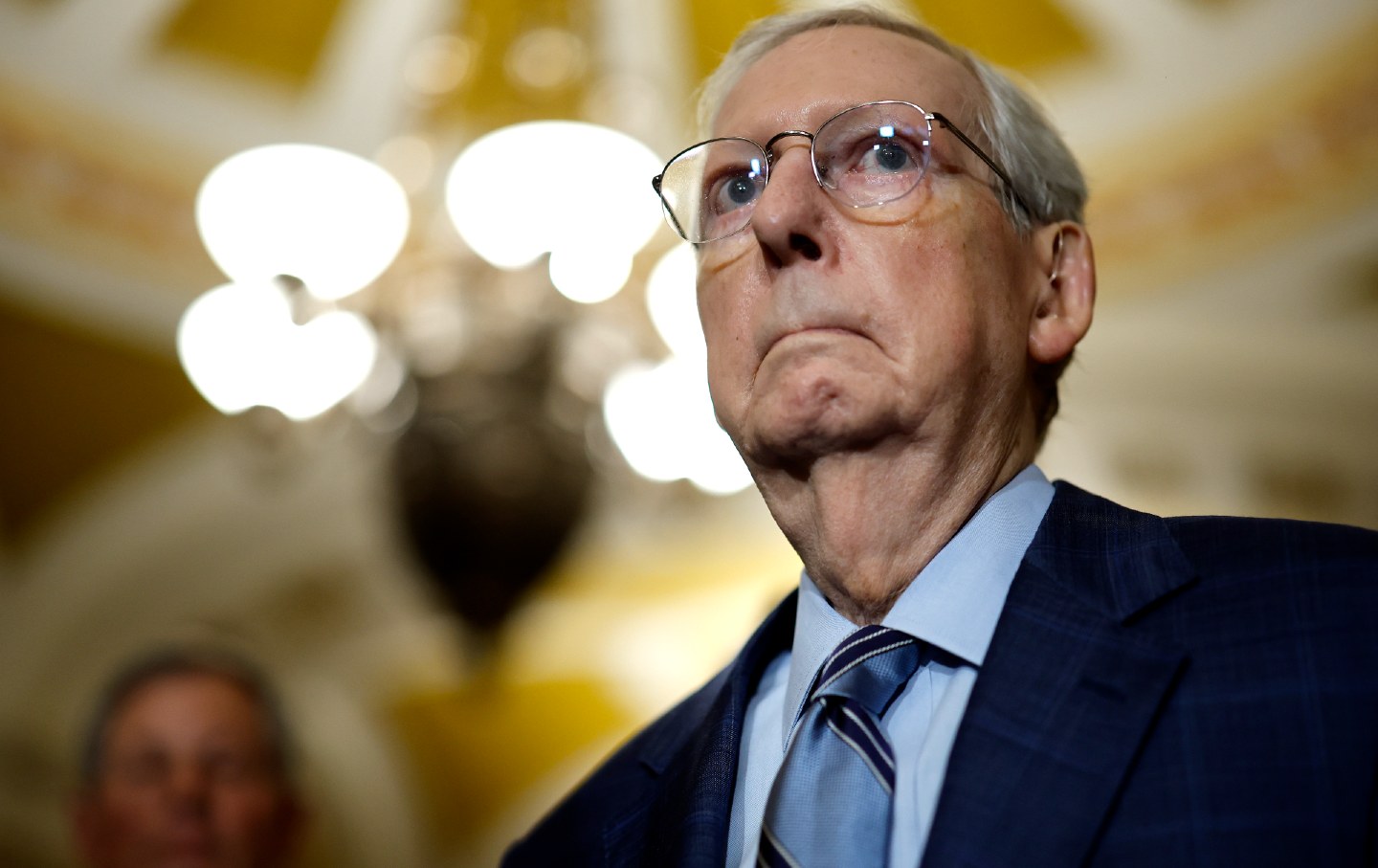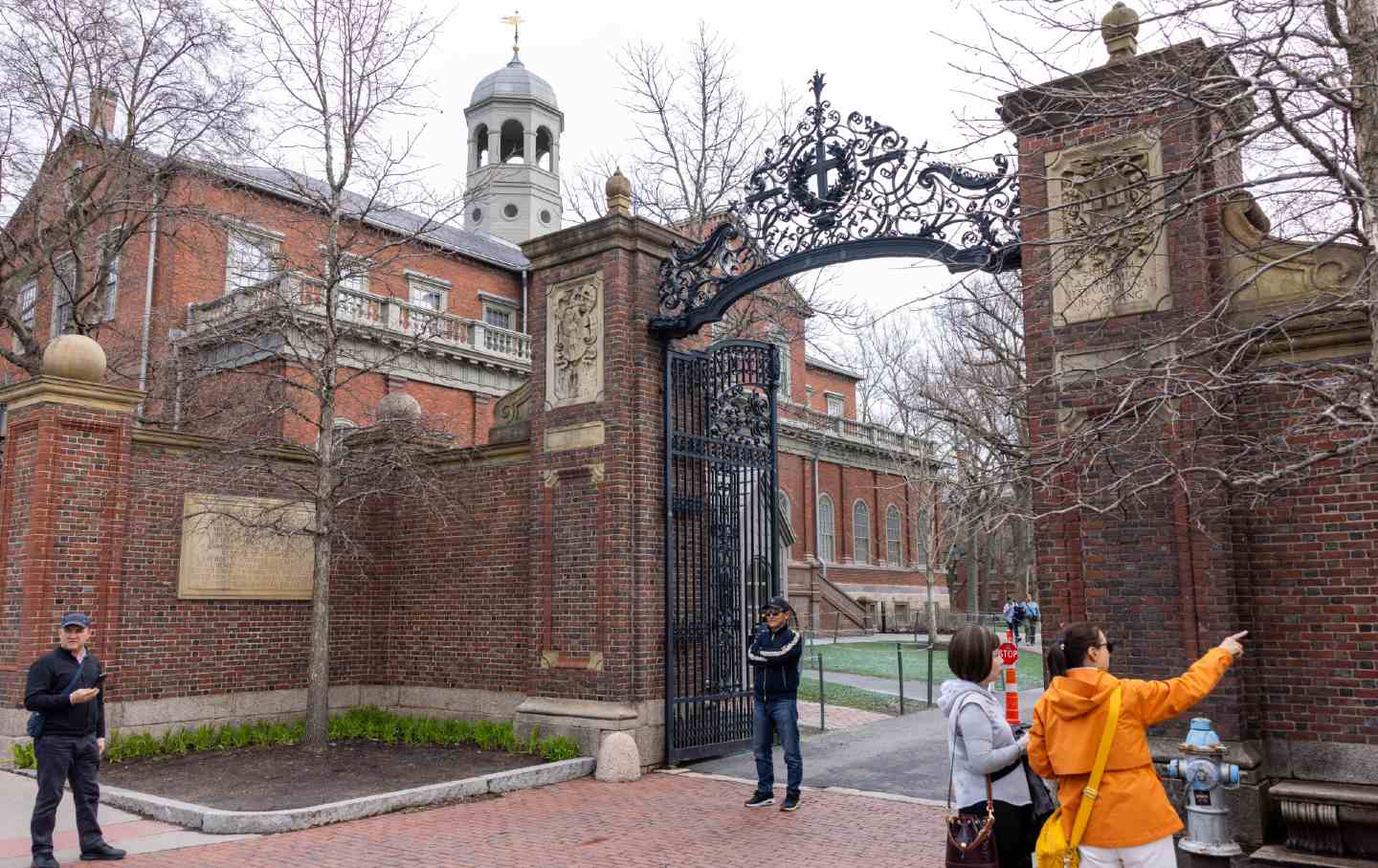Mitch McConnell Will Not Go Gently Into the Senate Goodnight
Even if the senator wanted to retire, there’s no way he’ll let Kentucky’s Democratic governor choose his replacement, even temporarily.

Senate minority leader Mitch McConnell (R-Ky.) listens to reporters’ questions during a news conference at the US Capitol on September 12, 2023.
(Chip Somodevilla / Getty Images)Senator Mitch McConnell is not well. Without going too deep into an armchair diagnosis of his recent spate of freezes and falls, it shouldn’t be controversial to say that an 81-year-old man who mysteriously stops talking and can’t start up again is likely suffering from some kind of significant health issue.
If he were a woman, the calls for him to retire would be deafening. If he were a Democrat, the calls would be coming from within his own party. If he were Joe Biden, The New York Times would run a three-part exposé on his nap times while CNN ran a “25th Amendment Tracker” keeping tabs on which cabinet officials had publicly agreed to remove him from power. But McConnell is a Republican man, which means nobody is going to pressure him into getting out of the way so somebody else can frost the glass of representative democracy.
McConnell, of course, shows no sign of being willing to retire. In private calls, he has allegedly assured Republicans that he is “fine,” and I guess everybody is supposed to take his word for it. The most simple reason for his intransigence is the pride that seems to afflict every octogenarian politician in this broken republic. For reasons I hope to live long enough to discover, old politicians seem to think they are indispensable and will continue to run for office and cling to power until the great Voter in the Sky escorts them to a farm upstate. McConnell may simply be doing what others in his generational cohort do: refuse to cede the floor to the future.
But that explanation risks treating McConnell as a normal person, and McConnell is far from normal. He is perhaps the most successful congressional operator since Henry Clay and a man who wouldn’t turn on a light switch unless it somehow helped Republicans win political power. Whether or not McConnell wants to retire is irrelevant; from his perspective, he probably can’t. That’s because his home state of Kentucky has a Democratic governor, and a law McConnell helped engineer to limit that governor’s choices on McConnell’s replacement is probably unconstitutional.
In 2019, Kentucky shocked the country by electing Andy Beshear, a Democrat, as its governor (yada, yada, all politics is local). This year, Beshear is up for reelection, and he’s running against McConnell ally Daniel Cameron, who was last seen refusing to indict the police officers who killed Breonna Taylor. Beshear leads Cameron by eight points, according to recent polling data.
Kentucky is one of 46 states that allow their governor to fill US Senate vacancies until a special election can be held and the voters can determine who will finish the senatorial term. (North Dakota, Oregon, Rhode Island, and Wisconsin are the only states that don’t allow these kinds of temporary gubernatorial appointments but instead go straight to special elections.) This means that if McConnell retires while Beshear is in office (which might be for a long time yet), Beshear gets to fill his seat temporarily.
But there’s a catch. In 2021, at the urging of McConnell, Kentucky became the 11th state to limit the governor’s choices for a replacement senator. The Kentucky law requires the governor to pick a senator from the same party as the retiring senator, and requires the governor to pick from a list of three candidates provided by the executive committee of the departing senator’s political party. The Kentucky legislature passed the law over Beshear’s veto.
If that scheme sounds odd to you, it should, because it almost certainly violates the 17th Amendment of the Constitution. The 17th Amendment, ratified in 1913, provided for the direct election of senators by popular vote. The amendment also empowers the “executive authority of the state”—which means the governor—to fill Senate vacancies, as long as the legislature gives them authority to do so before a special election is held. Before the change, senators were chosen directly by state legislatures, which meant that party bosses were able to hand out Senate appointments as if they were a patronage position.
Kentucky’s replacement law is exactly the kind of thing the 17th Amendment was meant to stop. In his veto statement, Beshear explained the constitutional problems with the law as well as I can. The governor wrote: “The Seventeenth Amendment does not authorize legislatures to direct how the Governor makes an appointment to fill vacancies, and the legislature may not impose an additional qualification on who the Governor may appoint beyond the qualifications set for a United States Senator set forth in the Constitution.”
If McConnell retires, the most likely thing for Beshear to do would be to appoint whomever he wants, let the Kentucky legislature sue him, and take the case to the Supreme Court. Despite Republican control of the court, I think Kentucky’s law is likely to lose. Even conservative legal commentators have noted the potential constitutional weakness of the Kentucky replacement scheme.
Still, even if Kentucky’s legislature manages to overcome the 17th Amendment, there is yet another wrinkle: Who is going to tell Beshear’s replacement senator to go home? Remember, as of now, Democrats still control the Senate. Beshear would name a replacement; that replacement would present his credentials to the Democratic-controlled Senate; and that’s just about all it takes to make a new incumbent a senator. By the time the appeals made it to the Supreme Court, Kentucky would be at or near the special election anyway.
McConnell, of all people, understands how raw political power works, and he surely understands that Democrats have it right now, regardless of Kentucky’s constitutionally questionable law. Even if McConnell’s Senate seat flips to a Democrat for only a few months, those are a few months during which the Democratic majority would be freed from the clutches of Joe Manchin and Kyrsten Sinema. A motivated party could push through a lot of federal judges in a few months.
Popular
“swipe left below to view more authors”Swipe →Whether McConnell retires “gracefully” or orders his staff to Weekend at Bernie’s him until 2026 probably depends on whether Beshear wins reelection in Kentucky. McConnell may be unwell, but I doubt he’s forgotten “how to do politics.” Ironically, McConnell’s entire accursed career has probably done the most work to create the Senate conditions that require him to hang on until the bitter end. The Senate that McConnell created is one devoid of grace: It’s now just a raw exercise in obstruction, where even human frailty is exploited for partisan gain. Somewhere, I bet Ted Kennedy (whose death McConnell exploited to deny the inclusion of a public option in the Affordable Care Act) is watching McConnell’s travails with great interest.
McConnell’s legacy is partisanship, whatever the costs. That seething commitment to do only what is in the best interests of the Republican Party means that right now, McConnell is locked into his role as another Republican vote, at the cost of his dignity and health.
Hold the powerful to account by supporting The Nation
The chaos and cruelty of the Trump administration reaches new lows each week.
Trump’s catastrophic “Liberation Day” has wreaked havoc on the world economy and set up yet another constitutional crisis at home. Plainclothes officers continue to abduct university students off the streets. So-called “enemy aliens” are flown abroad to a mega prison against the orders of the courts. And Signalgate promises to be the first of many incompetence scandals that expose the brutal violence at the core of the American empire.
At a time when elite universities, powerful law firms, and influential media outlets are capitulating to Trump’s intimidation, The Nation is more determined than ever before to hold the powerful to account.
In just the last month, we’ve published reporting on how Trump outsources his mass deportation agenda to other countries, exposed the administration’s appeal to obscure laws to carry out its repressive agenda, and amplified the voices of brave student activists targeted by universities.
We also continue to tell the stories of those who fight back against Trump and Musk, whether on the streets in growing protest movements, in town halls across the country, or in critical state elections—like Wisconsin’s recent state Supreme Court race—that provide a model for resisting Trumpism and prove that Musk can’t buy our democracy.
This is the journalism that matters in 2025. But we can’t do this without you. As a reader-supported publication, we rely on the support of generous donors. Please, help make our essential independent journalism possible with a donation today.
In solidarity,
The Editors
The Nation








